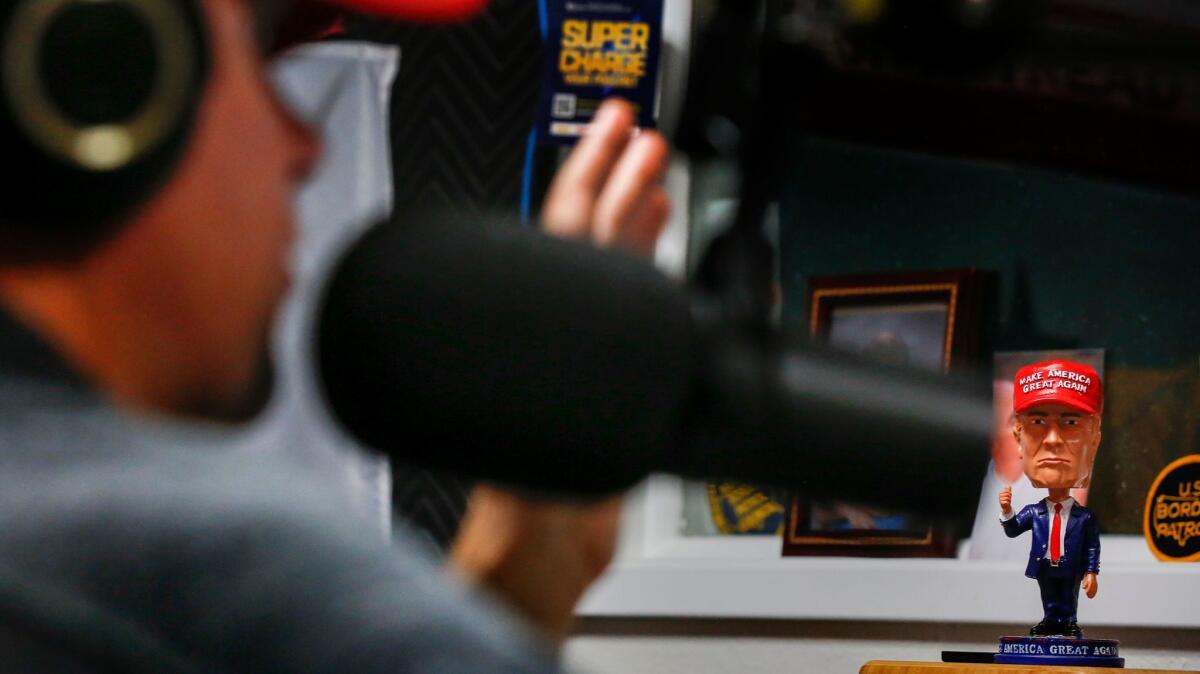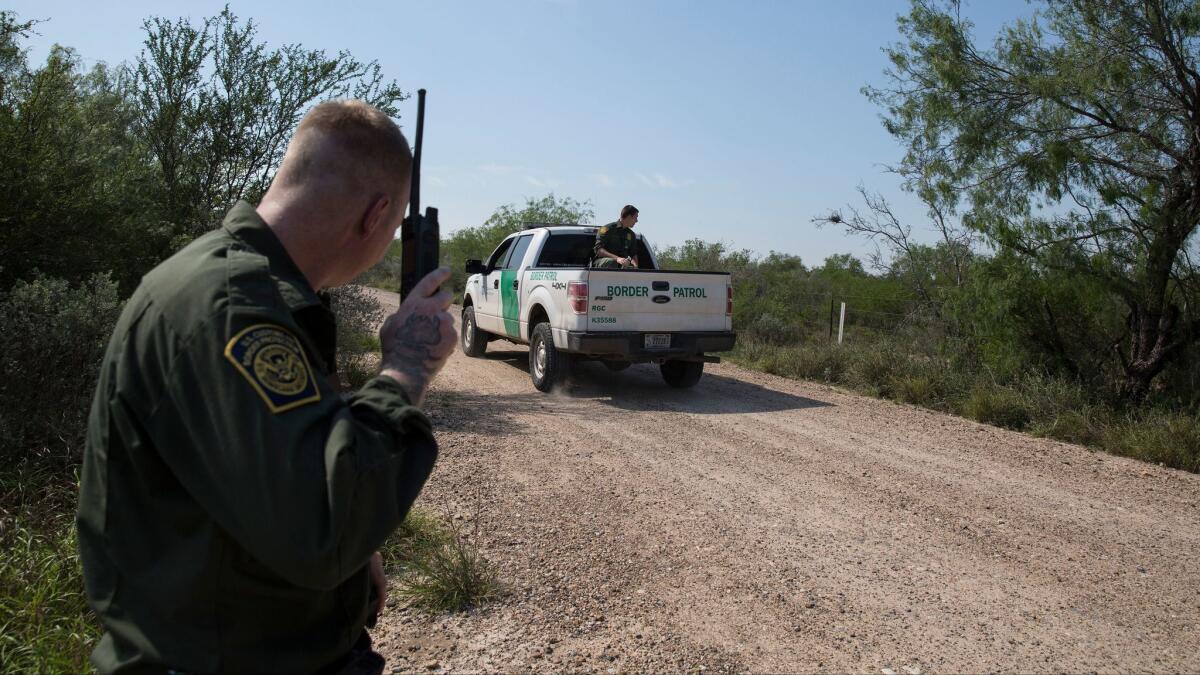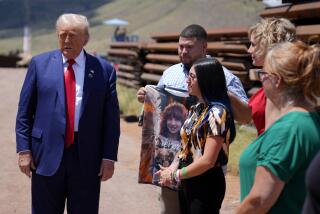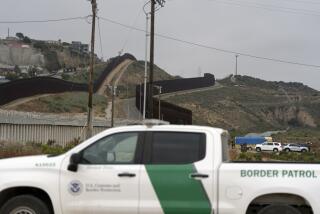This podcast spent years arguing that Border Patrol agents have been ignored. Then, Trump called

‘The Green Line’ podcast has spent years arguing that front-line Border Patrol agents have been cast aside and ignored. But all that’s changed now that Donald Trump is president. (Mark Boster / Los Angeles Times)
On a Tuesday morning in March, Border Patrol agent Shawn Moran settled into a leather chair in his recording studio, put on his headphones and, with his co-host Art Del Cueto on the line from Tucson, hit play on the recorded opening for their podcast.
The voice of Donald Trump, on the campaign trail, sounded from the speakers: “We are going to build a great border wall.”
An American flag covered the wall behind Moran, opposite a string of Christmas-colored bullet casings. To his right, a Gadsden flag defiantly proclaimed “Don’t Tread on Me.” And perched on his desk, near a Trump bobblehead in a “Make America Great Again” hat, was Moran’s ticket to Trump’s inauguration.
Since its debut in 2012, “The Green Line” podcast has been a voice for the National Border Patrol Council, which represents thousands of Border Patrol agents around the nation.
Started by Moran, who until recently was the union’s spokesman, and co-hosted by fellow agents and union officials Del Cueto, from Tuscon, and Chris Cabrera in the Rio Grande Valley, it has been an “unapologetically conservative” program whose hosts have spent years forcefully arguing that front-line Border Patrol agents have been ignored, under-resourced and cast aside by their leadership and politicians of both parties.
But all that changed when Trump, whom the union prominently endorsed last March, became president.
Now, as Del Cueto puts it, “we have a seat at the table.” Or, as he said in an episode of “The Green Line” after the election, “we established ourselves as big-time players in the game.”
In part, the show reflects the routine grievances of labor unions: Agents need better pay, more resources and training, and less unnecessary bureaucracy. But the “The Green Line” has also been based on the premise that agents for years have been held back from doing their jobs to find and remove immigrants in the country illegally.
“I think the job is fairly straightforward,” Moran said in an interview. “If you’re in this country illegally and you don’t have documents to be here, you should be removed.”

Immigrant and Latino advocates say their communities are increasingly beset by fear in response to the Trump administration’s hard-line rhetoric on immigration. But the way Moran sees it, that reaction is the result of the Border Patrol not being as forceful as it should have been over the years.
“I would blame the agency for backing down every time there’s a protest or an immigrant rights group complaining about something we’ve done,” he said. “I’ve said it for many years that if you cried loud enough and long enough about what the Border Patrol was doing, they would stop doing it. And I think that’s just wrong.”
That’s a message that troubles civil liberties activists, immigrant advocates and others who have been arguing that the agency is in need of serious reform on issues such as use-of-force policies, corruption and discipline.
In May, shortly after the union issued its presidential endorsement, Trump called into “The Green Line” for an interview and Moran laid out for him some of the ways he felt agents had been held back.
“Over the past 20 years, we have been stopped every time we have been effective at enforcing this nation’s immigration laws,” Moran told Trump. “Things like interior city enforcement, employer sanctions for those who hire illegal aliens and immigration checks on public transportation are just to name a few. What would the job of a Border Patrol agent look like with Donald Trump as president?”
“It would be much different than it is now,” Trump responded. The then-presumptive Republican nominee didn’t venture much into policy details. But he was clear about one thing: He was going to let agents “do their job the way they want to do it.”
“I have your back,” Trump told the hosts. “Believe me, you are incredible people and we are with you 100%.”
In November, Del Cueto, Cabrera and Moran flew to New York City to attend Trump’s election night party at the Hilton Midtown.
After Trump declared victory in the early morning hours, the president-elect walked up to Del Cueto, shook his hand, gave him a high-five and said “Art, get ready to work,” Del Cueto recalled in a podcast after the election.
Days after he was inaugurated, Trump signed two executive orders to crack down on illegal immigration in the nation’s interior and at the border. He pledged to hire 5,000 additional Border Patrol agents, expand the number of detention facilities along the border, end a policy that the union has decried as “catch and release” and prioritize federal prosecutions of crimes related to the southern border.
The day after those orders were signed, Border Patrol Chief Mark Morgan resigned after having been on the job for just a few months.
Morgan, who had spent most of his career in the FBI, was hired to bring an outsider’s perspective to the Border Patrol, which has faced intense scrutiny in recent years after a number of use-of-force and corruption cases.
His credentials were routinely mocked on “The Green Line” — when his name was mentioned, the hosts would play a recording of Keanu Reeves shouting “I am an FBI agent!” in the 1991 surfer movie “Point Break.”
Morgan’s resignation was a sign, some said, that the union was successfully flexing its political muscles.
“The union didn’t make any bones about the fact that they were in the White House,” said former U.S. Customs and Border Protection Commissioner Gil Kerlikowske, who retired in January. “Mark Morgan had an outstanding career at every level … but [the union] didn’t want an outsider. And the White House made their feelings known.”
Now, with the Border Patrol looking at a massive expansion, the union is pushing the federal government to improve agents’ pay, which union officials say will improve retention — a problem that has dogged the agency.
Since the 1990s, the Border Patrol has seen massive growth. U.S. Customs and Border Protection is now the nation’s largest federal law enforcement agency, with a budget of more than $13 billion last year. In 1992, there were 4,100 Border Patrol agents in the country. In 2016, there were nearly 20,000.

Meanwhile, the total number of apprehensions has plunged from about 1.6 million in 2000 to 415,000 in 2016, a drop experts say suggests lower migration flows to the U.S.
In the weeks since Trump was inaugurated, those numbers have fallen even further, a development the Department of Homeland Security has linked to the administration’s tougher stance on immigration.
But as the agency has grown, it has often struggled to hire and keep agents. There are more than 1,200 previously authorized open positions the Border Patrol would need to fill before embarking on Trump’s proposed expansion.
“It’s not an easy job,” Moran said. “You’re almost always sent away from areas that you’re familiar with. And some of the areas are very remote. That’s why we have a problem holding on to people for long periods of time.”
The idea behind the podcast was to tap into some of that isolation by giving agents something to listen to on what can be long drives to and from their posts on the border, Moran said.
Moran recently lost his election to the national union’s leadership, and he is no longer with the podcast, but he continues serving as a local union rep.
These days the podcast’s audience has expanded as politicians, including Sens. John McCain and Ron Johnson, have been calling in, and media from around the world and the larger public tune in. The show has a number of sponsors — including title sponsor Breitbart News. In addition to streaming, it is broadcast weekly on Tucson-based KNST.
Mitra Ebadolahi, a staff attorney with the ACLU’s Border Litigation Project, said people should be deeply concerned about the union’s growing influence.
The union “is constantly complaining that it does not have unfettered discretion to do what it wants,” she said. “No law enforcement agency has unfettered discretion to do what it wants. Nor should it in a free society.”
In a recent podcast, Cabrera said large audiences are turning to the show to better understand border agents, in part because the Border Patrol itself has often been less than forthcoming.
“We’ve kind of become the de facto spokesman for the agency just because a lot of times the agency won’t speak,” he said.
Now, said Del Cueto, the time has come for the union to use its influence.
“Now it’s time to deliver,” Del Cueto said during that same episode. “I believe we have someone in the White House that’s really going to help us now. I think we’re going to move forward.”
For more Inland Empire news follow me @palomaesquivel
Click here for a Spanish version of this story
More to Read
Sign up for Essential California
The most important California stories and recommendations in your inbox every morning.
You may occasionally receive promotional content from the Los Angeles Times.











